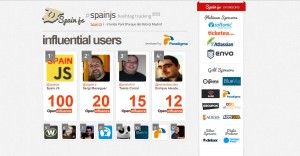Madrid wakes up to a shiny July day. A bunch of people walk through the central Retiro Park towards a building with the exotic name of Florida Park. They bring their laptops inside their backpacks. Then they stand in line to get their accreditation for SpainJS, the very first international JavaScript congress ever held in Spain.
The programme of Spainjs consisted in a day of workshops day and two-day of speaking sessions. The diverse profiles of the speakers, from framework creators to videogames programmers, was a good starting point. The quality of speakers was the best feature of the event. Clear, straightforward and amusing, they manage to inspire and engage the audience. Shyness or language barrier did not prevent attendees from standing up ask their questions. Asking questions via Twitter was also popular.
The sessions
But the quality of the talks made us forget all these details. Clear and well segmented, the lectures were the highlight of the event. A robot called Hubot, which interacts with the workers of GitHub via chat, was the first presentation conduced by Vicent Martí (@tanoku). The comic-like graphics and the rythm of the explanation awoke so many attendees. Jeremy Ashkenas (@jashkenas), the creator of Backbone and CoffeeScript, coded and compiled some examples live to show how simple to use was his framework.
After the coffee break, Karolina Szczur (@karolinaszczur) showed us how to keep the design simple using the accurate framework for the project. Jakob Mattsson (@jakobmattsson) introduced Node.js mixed with some unfortunate jokes that tried to amuse the audience, but notoriously failed in doing so.
Horia Dragomir (@hdragomir) walked back and forth the scenery catching everybody's attention after lunch with a speech about JavaScript for mobile devices. He gave cool and interesting UI examples for the ones that he dearly called "these babies". Tomás Corral (@amischol) stated the high coding level that exists in Softonic, but also the poor spoken English they have. He talked about code minimizers demonstrating how GZip without the initial G stands for zip, and that means archive compression.
The last talk on Friday was held by Christian Kvalheim (@christkv). He coded a sample of the Pacman and demoed it. It was HTML5 and JavaScript based, and also allowed various players on the same screen.
On Sunday morning, Ramón Corominas (@ramoncorominas) illustrated WAI-ARIA through a journey on Star Wars, starting on the Dark Side to end being a Jedi that made completely accesible webs for the disabled. Spine.js creator, Alex MacCaw (@maccman) showed the issues that usual sites like Twitter, Facebook and Instagram have regarding their speed and time to charge. We learnt that speed is a perception, and the code can do the trick on the background to show "the magic" to the user.
Keith Norman (@keithnorm) showed us some examples of code sharing between the server and the client. Tuenti programmer
Nuria Ruiz (@pantojacoder) showed some improvements of their site to make it load 5 times faster.
Brian McKenna (@puffnfresh) presented Roy JavaScript compiler. A legendary man that called himself an oldie, Javier Arévalo (@TheJare), talked about his wide videogames programming experience, being working on that since 1986 -even before the birth of a lot of the attendees. Last but not least, Jonathan Azoff (@azoff) demonstrated Tacion.js, a jQuery Mobile app to sincronize his talk with people's devices.
Contribution of Paradigma as sponsors
As one of the sponsors, Paradigma tried to get involved a bit beyond the standard pack on offer. We set up a tracking tool of #spainjs to follow the event from the inside and from the office. Kudos to Israel Alcázar of the NGO organizing the conference, APRODEWEB, who listened kindly to our proposal. The organizers kindly projected the tool non-stop on one of the screens of the conference. A few attendees were particularly popular at different times along the event, some times to their own surprise.

Also, as recruiters, Paradigma were keen on being noticed by talented attendees. We designed a flyer with a QR code pointing to our tracking tool of #SpainJS. We then tracked the visits to our web site via the online hashtag tracking tool and from the offline flyer and we had fun for a while watching the inflow of traffic.

The logistics
The team wearing red shirts made an awesome job in organizing the event. Here at Paradigma Tecnológico we appreciate their effort and we thank them all for inviting speakers of such a high calibre. Inevitably some things didn't go as expected. The decision to hold the conference in the very heart of Madrid was a great one but Florida Park was probably not the proper venue to host the event. More akin to hosting flamenco dance and musicals with vedettes in the early hours of the morning than loads of fanboy geeks, the venue was an odd choice. Several boys spent more time fantasizing with go-go girls dancing in the cages (not removed for the occasion) above our heads than paying attention to the speakers. For sure.
For those who got up early, the waiting times to get the badges and bags were too long. For instance, some trouble with the streaming resulted in delayed sessions. We may suggest to the organizers that it is more sensible to care for your attendees first and foremost. People sitting at home or in their offices watching the talks via streaming should come second. Which reminds me that broadcasting in the US is delayed enough time to let censors intervene and veto commercials during the Superbowl breaks since Justin Timberlake famously exposed some critical part of Janet Jason's body. If US followers can hold for the last minutes of the Superbowl, why wouldn't we allow some delay when online visitors watch a few JavaScript lectures at home? Organiser may want to improve some other slips of basic logistics such as requesting the the official accreditation to the attendees at the entrance for identification purposes. Sponsors could not be identified since they had no distinctive badge.
The conference did offer nice suprises. Phones and other electronic devices could be recharged on the public power leads. Nobody ran out of batteries. A big no-no was the lack of Internet connection. Sadly the local ISP, Telefónica, didn't provide the wifi signal that the organization ordered (and paid for). This frustrated a few trolls, but also prevented #spainjs from turning into a trending topic during the days of the conference. Worse still, we couldn't test the live examples the speakers provided.
We spaniards love freebies. We expect promotional material to impress us. That's why we missed the usual merchandise of many other conferences so much. The backpack contained a few flyers but no sight of some essential stuff even in the digital age: a notebook and a pen. I missed a printed schedule of the sessions. The air conditioning made the huge lamp tinkle but was not really effective. Finally, as lunch packs go, the one at Spainjs will not be celebrated in years to come.
Conclusion
In the end, with tablet raffles, self-promotion lightning talks, fruit baskets and churros for breakfast, the real winners of the event were the talks. Interesting, enjoyable and inspiring, held by first line speakers. Organization work needs to be improved, but it's the first time and everybody has to make mistakes to learn. But the level of the lectures was outstanding. And that is much more difficult to maintain. Good luck!
Comments are moderated and will only be visible if they add to the discussion in a constructive way. If you disagree with a point, please, be polite.




Tell us what you think.